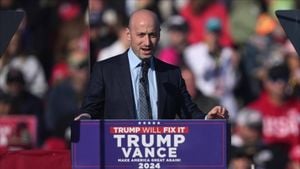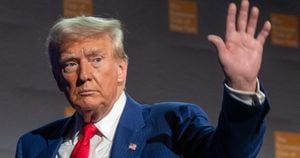Elon Musk and Donald Trump, two towering figures of modern capitalism, have long shared a complicated relationship. From mutual admiration to public spats, their interactions paint a vivid picture of the interplay between business, politics, and social media.
At the dawn of Musk's dominance with Tesla and SpaceX, Trump often praised the billionaire's innovative spirit. Indeed, during his presidency, Trump would frequently commend Musk for his work, seeing him as aligned with the quintessential American entrepreneurial spirit. It seemed like they were on the same page, particularly when both faced significant scrutiny from mainstream media.
Yet, as the political tides turned, so did their rapport. Post-2020 election, Musk's infrequent endorsements of Trump evolved amid Trump's polarizing impact. Musk's public dismissal of traditional political affiliations hinted at his desire to maintain his creative autonomy. He openly questioned the motivations of political elites, even expressing appreciation for figures like Andrew Yang, who offered unconventional solutions outside the binary politics often associated with Trump.
Things took another turn with the advent of the 2022 midterms, where Musk’s growing influence on social media platforms, particularly Twitter (now X), began to overshadow Trump, raising questions about who could rally the right-wing base more effectively. Musk's decision to reinstate certain controversial figures and statements sparked heated debates among political circles, illustrating the diverging paths of the two men.
By the time Trump announced his candidacy for the 2024 election, the dynamics had shifted yet again. Musk, having acquired Twitter, seemingly became the arbiter of online discourse, reshaping narratives and controlling the platforms where these discussions unfolded. This newfound power seemed to push Trump to seek Musk's endorsement more explicitly, with rumors swirling about potential collaborations.
Adding to the intrigue, Musk's unpredictable tweets occasionally touched upon Trump’s policies, sometimes positively, sometimes with skepticism. This fluctuation often led analysts to question if Musk was quietly positioning himself as the new conservative overlord, replacing traditional figures with his own brand of influence.
The two also share common ground on issues like environmental regulation, where both have faced criticism for their stance. Musk, through Tesla’s green energy initiatives, and Trump, through deregulatory measures, highlight how their priorities sometimes align, blurring the lines between their interactions.
Meanwhile, the media has played its part as well, fueling speculation about their relationship status. Coverage often oscillates between portraying Musk as Trump’s new ally, especially on topics of industry deregulation, to highlighting Musk's tensions with Trump loyalists amid shifting allegiances.
Despite this entangled web, both men seem to acknowledge the utility of each other’s support. For Trump, Musk's backing could mean bolstered public perception among younger, tech-savvy voters. For Musk, aligning with Trump could signal his entry back onto the political stage, especially if he decides to leverage his influence for broader systemic change.
Looking forward, the 2024 election looms large over their potential alignment. With Trump solidifying his campaign and Musk continuing to wade through the political waters of social media, one can only wonder how long they can sustain such an intriguing, roller-coaster relationship. Could Musk endorse Trump? Or will his erratic nature keep them apart? One thing's for sure: their interactions will continue to fascinate observers and shape the contours of contemporary American politics.
Whatever the future holds, Musk and Trump’s relationship exemplifies how intertwined the realms of tech and politics have become. Whether they rise together or fall apart, their saga remains captivating against the backdrop of America’s rapidly changing political and social fabric.



